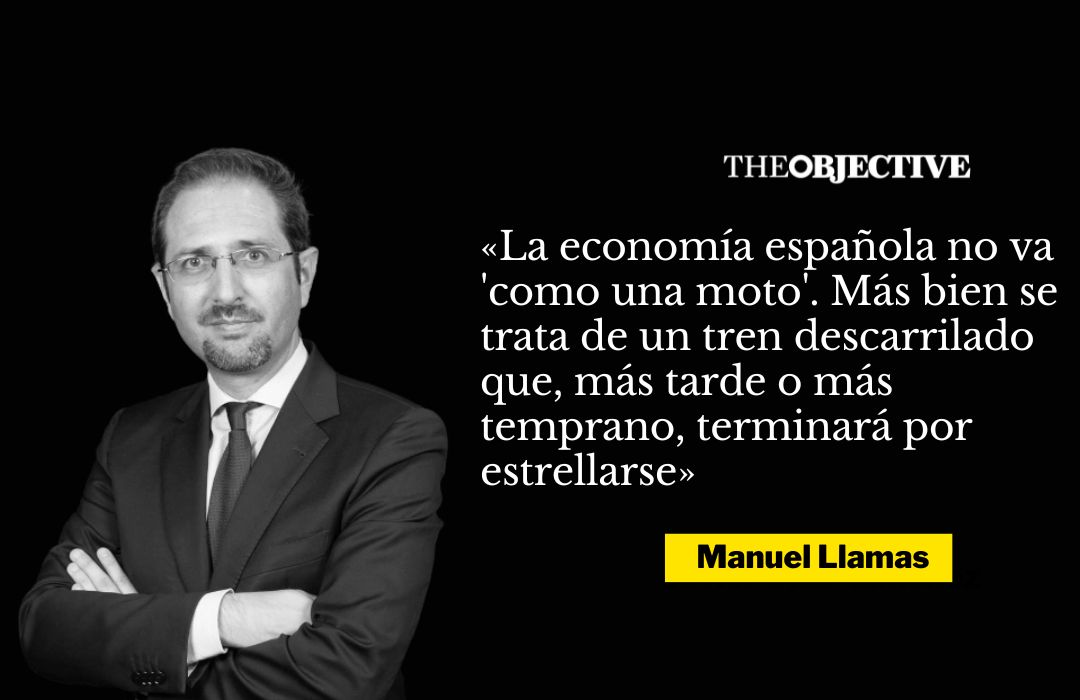The Spanish economy has suffered many and very serious structural problems. Not now, but for many years. Therefore, precisely, the irresponsibility shown by the government of Pedro Sánchez, when far from recognizing the reality, is particularly worrying. Chooses to create or manipulate data with the sole purpose of creating a narrative capable of capturing votes Selling something that doesn’t exist
The Spanish economy does not go “like a motorcycle”. Rather, it is a derailed train that, sooner or later, will crash.. Moreover, in the context of the economic growth highlighted by the government, when the time perspective is extended, we can see that Spain has recorded one of the worst economic performances among the developed countries under the Sánchez era.
All countries, more or less, had to face, first, the outbreak of the pandemic in early 2020, and then, the rise in inflation. But not everyone comes out of the hole the same way. Spain has accumulated only 0.4% growth since the end of 2019, the fourth worst evolution in the entire OECD., followed by Germany, the United Kingdom and the Czech Republic. It took three and a half years to recover the wealth lost during the coronavirus crisis.
In this way, one of the biggest recessions in the world in 2020, with a drop in GDP of more than 11%, The national economy has experienced one of the slowest and weakest recoveries, Europe and the rich countries as a whole. If so, nothing to celebrate. Especially if one takes into account that, due to this poor growth, the sharp increase in inflation from 2021 indicates a general impoverishment of households. Between 2019 and 2022, real household incomes will decline by 3.6%The second largest drop in the OECD after Austria.
“Analysts and investors already know that debt sustainability is a serious problem for Spain, along with Italy and Greece.”
These poor outcomes are symptomatic of a disease rooted in excessive intervention and increasingly suffocating taxation that ends up weighing on the competitiveness and productivity of the private sector, the only real source of wealth and employment. However, the drama does not end here. Spain has one of the most difficult and inefficient labor markets in the world.. For this reason it is not surprising that the unemployment rate is around 12%, almost double the Eurozone average.
But if this unfortunate picture is added, in addition, the severe deterioration of the public accounts, Spain’s economy remains one of the most vulnerable in Europe before any storm or external shock erupts Some fit. With a public debt of more than 110% of GDP, a deficit of 4.8% in 2022 and an interest cost that already represents 5% of public revenue, the current environment of high rates poses a serious threat to the fiscal stability of the state. medium term.
Without resorting to painful and unpopular austerity, it will be difficult to reduce the level of Spain’s debt and reduce it. More expensive financing translates into a higher interest bill if rates remain high over time. Even if inflation comes down earlier than expected, along with its rates, the necessary debt reduction will be weighed down by lower revenue collection and lower nominal GDP growth, so it may not be the solution. With total financing needs — including rebates — of 250,000 million euros per year, over 20% of GDP and growing, Escaping this particular spiral of debt, exacerbated by economic and budgetary mismanagement by Sánchez and his cronies, seems increasingly difficult.
Analysts and investors already know that debt sustainability is a serious problem for Spain, along with Italy and Greece. What’s worse is that the PSOE government and – now – Sumer are not planning to do anything to the contrary. Since this is not a problem for them, His plan is to continue to increase spending in an unbridled manner, hoping that economic growth and tax increases will reduce the deficit., central banks have become the lifeblood of the most reckless and wasteful governments, not realizing that the rise in interest rates and the resulting increase in the cost of finance represent a fundamental change in the rules of the game that have prevailed over the past decade. . Now it’s time to swim, the question is whether Spain can stay afloat.

